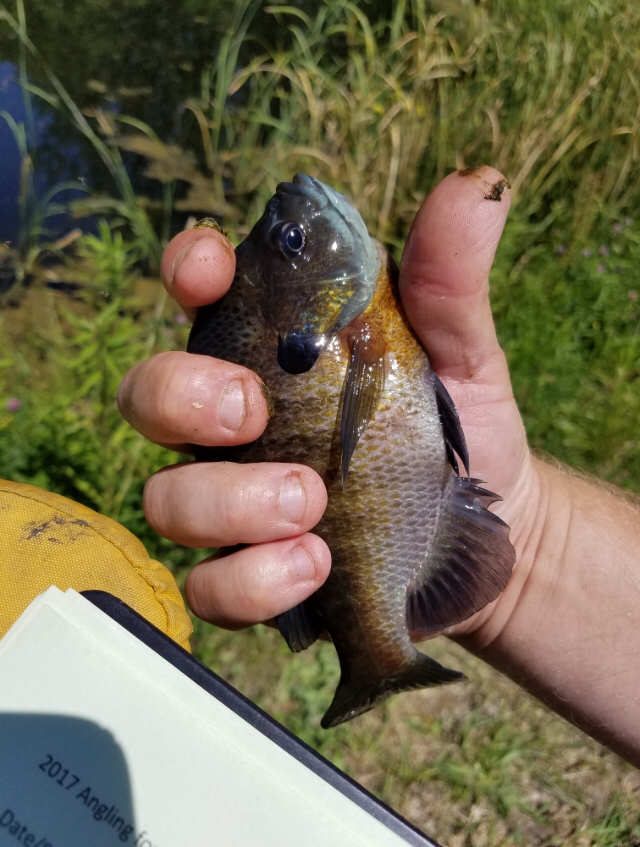Study explores evolutionary impact of sociable fish prone to being caught
Photo Provided by Michael Louison
Image of a bluegill fish. In a study conducted and designed by Michael Louison, results show the friendlier the fish, the more likely it is to be caught.
July 26, 2018
Bluegill fish who are more sociable tend to be more vulnerable to being captured by anglers, which are people who fish using fishing rods, according to a new study.
Cory Suski, associate professor in ACES and co-author of the study, said in an email they ran two behavioral assessments. One determined whether the bluegill fish were social, such as if they like to hangout in a group of fish versus being alone, and the other used pairs of fish to determine whether they were dominant or not.
After the tests were done, Suski and others related the lab behavior, sociability and dominance, to the fish’s rate of being caught.
“What we found was that social fish were more likely to be captured than were fish that preferred to be by themselves,” Suski said. “Dominance did not influence capture likelihood and dominant fish were just as likely to be captured than were subordinate fish.”
Suski said there are two reasons why social fish tend to be captured more than loner fish.
Get The Daily Illini in your inbox!
“First, by being part of a group, social fish take up a larger volume of a lake than do loner fish,” Suski said. “Alternatively, fish that live in groups typically have more competition for food — if a lure lands near a group of fish, everyone in the group may scramble to eat it or risk having it eaten by a competitor.”
Suski said contrary to social fish, loner fish do not have as much competition, so they are able to take their time, look at the lure and make a more cognizant decision as to whether they should take the bait or not.
Michael Louison, graduate student in ACES and lead author of the study, said he expected the more aggressive fish to be more likely to take the bait instead of a more social fish, which came as a surprise to him.
“I had expected that aggression was going to be the key thing that a fish that is aggressively attacking other fish is going to be more likely to see a lure and aggressively attack that, but that was not the case,” Louison said. “It was the sociability, which we did almost initially as a correlate with the aggression just to get a full picture, but as it turned out the sociability was the important thing.”
Louison said the fishing of more social fish might cause an impact on the evolution of a fish’s behavior and further research should be done in areas where people tend to fish more to evaluate what ecological impacts over-fishing of more social fish might have.
“What we found here is that more social behavior might be under selective pressure that we may be artificially selecting for basically anti-social fish and that could have impacts on group functions in these fish. It might have other impacts on other aspects of their behavior,” he said.
Louison said he does not know the degree of the impact or if the fishing of more social fish will cause an evolution to more anti-social fish, especially since bluegill fish are an extremely popular fish and abundant.
“I would say one thing we could do if problems do start to arise is have limits on capture. Another thing that could be possible, and this applies to not only bluegill but bass and some other fish as well,” Louison said.







